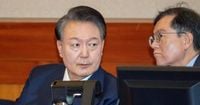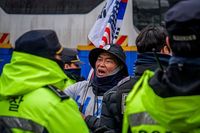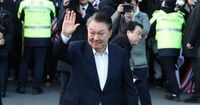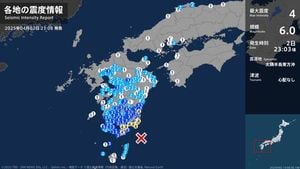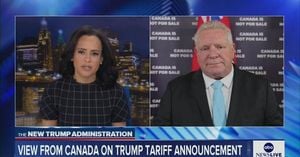As South Korea braces for a pivotal moment in its political history, President Yoon Suk Yeol awaits the Constitutional Court's decision on his impeachment, set to be announced on Friday, April 4, 2025. Yoon was suspended from office following his impeachment on December 14, 2024, after a controversial attempt to impose martial law that sparked widespread protests and political turmoil.
The Constitutional Court's ruling will determine whether Yoon will be permanently removed from office or reinstated. A minimum of six out of the court's eight justices must vote for his removal for him to be ousted, which would make him the second South Korean president in history to be impeached, following Park Geun-hye in 2017. If the court rules against him, a new presidential election must be held within 60 days, further complicating an already tense political landscape.
On April 2, acting President Han Duck-soo urged the nation to accept the court's decision calmly, emphasizing the importance of maintaining public order amidst fears of potential violence. "No matter what decision is made, we must calmly and coolly accept the results according to the principle of the rule of law," Han stated during a ministerial meeting focused on public safety ahead of the ruling.
Han's comments come as police ramp up security around the Constitutional Court, preparing for the possibility of unrest. The acting chief of the national police, Lee Ho-young, announced that approximately 14,000 officers will be mobilized on the day of the ruling, establishing a "vacuum state" around the court to prevent clashes between pro- and anti-Yoon demonstrators. Lee warned that any illegal acts would not be tolerated, and police would act swiftly against those threatening public safety.
The political atmosphere in South Korea has been charged since Yoon's declaration of martial law on December 3, 2024, which he justified as a necessary response to what he termed a national emergency. However, many South Koreans viewed the move as an overreach of power, prompting mass protests across the country. Yoon's attempt to impose military rule was met with fierce opposition, leading to his impeachment by the National Assembly.
In the wake of his impeachment, Yoon faced insurrection charges, becoming the first sitting South Korean president to be criminally charged while in office. His legal troubles have been compounded by a separate trial that began in February 2025, where he continues to contest the charges stemming from his martial law declaration.
Public sentiment regarding Yoon's impeachment remains sharply divided. A recent Gallup Korea survey revealed that 60% of respondents believe the impeachment should be upheld, while only 34% support his reinstatement. This division has fueled ongoing protests, with hundreds of thousands of demonstrators gathering in central Seoul in recent weeks to voice their opinions.
Yoon's supporters have rallied around him, decrying the impeachment as a "fraud" and calling for his return to power. However, opposition leaders, including Lee Jae-myung of the Democratic Party, have expressed hope for a reasonable ruling from the court, acknowledging the need for stability in the nation.
As the court prepares to announce its decision, international embassies in South Korea have issued advisories urging caution. The U.S. Embassy announced it would cancel routine consular operations on April 3 and 4, while the Chinese Embassy warned its nationals to avoid large political gatherings, citing the potential for extreme incidents.
The stakes are incredibly high as South Korea stands on the precipice of a significant political turning point. If the Constitutional Court votes to uphold the impeachment, Yoon will be removed from office, and the nation will need to navigate the complexities of a new election amidst ongoing political strife. Conversely, if he is reinstated, the political crisis is likely to deepen, with Yoon's governance already severely weakened by the impeachment proceedings.
The Constitutional Court's decision is not just a matter of legal proceedings; it represents a critical juncture in South Korea's democratic process. As the nation awaits the ruling, the eyes of the world will be on Seoul, watching how this pivotal moment unfolds in the context of South Korea's democratic integrity and political stability.
